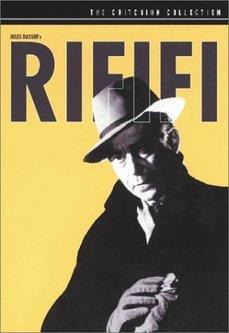Suspense
Index
Rififi is one of those films that seems to be at the center of all cinematic influences. It was directed in Paris by American expatriate Jules Dassin. Dassin made his name directing a series of tough-minded films noir in the 1940s, films like Brute Force, The Naked City, and Thieves Highway, before being exiled by the Hollywood blacklist. In London, he made another great, great film noir in Night and the City, but Rififi, made after a five year interval of unemployment in Europe, is Dassin's masterpiece.
Rififi is a heist film. It isn't the first such film--The Asphalt Jungle, Armored Car Robbery, Criss Cross, and Kansas City Confidential all predate it, and Jean-Pierre Melville's Bob le Flambeur is Rififi's exact contemporary--but after Rififi, the heist film was never the same. The centerpiece of the film (almost literally--it occupies the middle third of the movie) is a 30 minute sequence filmed without dialogue in which the details of the heist are depicted in intimate detail. The lack of dialogue makes for a breathless experience. All of the heist films that come after contain similar sequences, often as the climax of the film. It's not the climax of THIS film, though. There are still a kidnapping and several murders still to come. The remainder of the film shows the fallout of a perfect crime, which turns out not so perfect after all. The glue that holds the film together, apart from the striking stylistic elements, is Jean Servais as an aging crook trying to find his own redemption. It's a tremendous performance.
It's commonly held that this is a film that couldn't have been made in the United States during the 1950s. I don't think that's necessarily true, but the film certainly takes advantage of the looser censorship on the continent. It has a European feel to it, too, and that feel is where Rififi REALLY becomes the nexus of all cinematic realities. What we see in Rififi is a confluence of influences: German Expressionism, Film noir (itself derived from German Expressionism), and Italian Neo-Realism are stirred together into this film and the end result is something that looks startlingly like the films of the French New Wave, a movement still a couple of years down the road. The French New Wave is the gateway to "new waves" across the world, including America. Is Rififi the flashpoint? I think it might be. Francois Truffaut described Rififi as one of the best films noir he had ever seen. The freewheeling tour of Paris in Jean Servais's car near the end of Rififi--subjectively filmed as Servais's character is dying--looks a LOT like what Godard would do in Breathless.
Of course all of that is completely beside the point for a casual viewer. A casual viewer is going to approach Rififi like any other film: as an entertainment. Fortunately, it succeeds brilliantly as an entertainment, too, which is often the case with really influential films. The rest? Well, that's all gravy....

4/12/2006